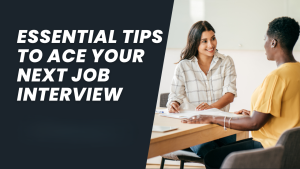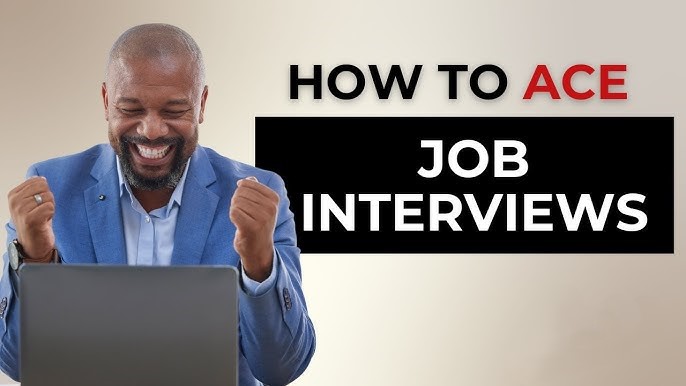Introduction
Acing a job interview requires more than just showing up it’s about preparation, confidence, and making a lasting impression. Whether you’re a seasoned professional or a first-time job seeker, these 10 proven tips will help you stand out and land the job. From researching the company to mastering common interview questions, this guide covers everything you need to know to ace your next interview.
Simple Ways to Ace Your Next Job Interview

1. Research the Company
Learn about the company’s mission, values, and recent news to show your interest and knowledge.
- Tip: Visit the company’s website and read their blog or press releases.
- Example: Mentioning specific company achievements can impress interviewers.
2. Practice Common Questions
Prepare answers for common interview questions like “Tell me about yourself” and “What are your strengths?”
- Tip: Use the STAR method (Situation, Task, Action, Result) for behavioral questions.
- Example: Practicing can help you articulate your thoughts clearly and confidently.
3. Dress Professionally
Choose an outfit that aligns with the company’s dress code and makes you feel confident.
- Tip: When in doubt, opt for business professional attire.
- Example: Dressing well shows respect and professionalism.
4. Arrive Early
Plan to arrive 10-15 minutes early to account for unexpected delays.
- Tip: Do a trial run to the interview location if possible.
- Example: Punctuality demonstrates reliability and preparedness.
5. Bring Copies of Your Resume
Bring multiple copies of your resume, a list of references, and any relevant work samples.
- Tip: Use a professional folder or portfolio to keep documents organized.
- Example: Having extra copies shows you’re prepared and detail-oriented.
6. Ask Insightful Questions
Prepare thoughtful questions to ask the interviewer about the role, team, and company culture.
- Tip: Avoid asking about salary or benefits in the first interview.
- Example: Asking questions shows your enthusiasm and curiosity.
7. Showcase Your Skills
Highlight your relevant skills and experiences that align with the job requirements.
- Tip: Use specific examples to demonstrate your achievements.
- Example: Quantify your accomplishments (e.g., “Increased sales by 20%”).
8. Practice Good Body Language
Maintain eye contact, offer a firm handshake, and sit up straight to convey confidence.
- Tip: Avoid fidgeting or crossing your arms, which can signal nervousness.
- Example: Positive body language can make a strong impression.
9. Follow Up
Send a thank-you email within 24 hours to express your appreciation and reiterate your interest.
- Tip: Personalize the email by mentioning specific points from the interview.
- Example: A follow-up email keeps you top of mind and shows professionalism.
10. Stay Positive
Approach the interview with a positive attitude and focus on your strengths.
- Tip: Visualize success and practice relaxation techniques to calm nerves.
- Example: A positive mindset can boost your confidence and performance.
Role of Preparation in Acing Your Interview
Preparation plays a crucial role in acing a job interview. It’s not just about knowing your resume but also understanding the company, the job role, and the industry. Being prepared means you can confidently answer questions, ask insightful questions, and demonstrate why you’re the perfect fit for the role. It also helps you stay calm and focused, which can be important for making a great impression during the interview.
Know Your Strengths and Weaknesses

Before going into your interview, take time to think about your strengths and weaknesses. Being able to talk about both shows self-awareness. For your strengths, focus on qualities that are relevant to the job and provide examples to back them up. When talking about weaknesses, choose something you are actively working on improving. Show that you are aware of your weakness and taking steps to grow in that area.
Be Ready for Unexpected Questions
Sometimes, interviewers may ask questions that seem strange or unexpected, such as “If you were an animal, what would you be?” or “Where do you see yourself in five years?” These types of questions are often meant to see how you think on your feet. Don’t panic stay calm, think carefully, and give a thoughtful response. It’s okay to take a second to gather your thoughts before answering, and keep your answers relevant to the job.
Don’t Be Afraid to Take Your Time

Sometimes in interviews, you may be asked a difficult question or one that catches you off guard. It’s okay to take a moment to think before answering. Pausing for a few seconds shows that you’re thoughtful and careful in your response. It’s better to take a brief pause than to rush into an answer you’re not sure about. A well-thought-out answer will always make a better impression than a quick, unclear one.
Make Your Answers Short and Clear
When answering interview questions, it’s important to keep your responses clear and to the point. Avoid long, rambling answers that don’t focus on the question. While it’s good to provide examples, make sure they are concise and directly related to what the interviewer asked. This will keep the conversation flowing smoothly and help the interviewer stay engaged.
Avoid Over-Explaining
While it’s important to answer questions in detail, avoid over-explaining or going off-topic. Over-explaining can make your answer sound less confident and might lose the interviewer’s attention. Stick to the main points and answer the question clearly. If the interviewer wants more detail, they will ask follow-up questions. Keeping your answers focused and to the point helps keep the interview moving efficiently.
Avoid Negative Talk About Past Jobs

It’s important to stay positive when talking about your previous jobs, even if you didn’t enjoy them. Avoid speaking negatively about your old employers, colleagues, or work experiences. Focus on the lessons you learned and how those experiences helped you grow. Negative comments can make you seem unprofessional or bitter, which is not the impression you want to leave during an interview.
Prepare for Different Interview Formats
Interviews can happen in many different formats, such as in-person, over the phone, or through video calls. Each format requires a different kind of preparation. If your interview is in person, make sure to dress professionally, arrive on time, and bring copies of your resume. For phone or video interviews, check your technology in advance. Ensure your phone or computer is charged, and the environment is quiet with good lighting. Preparing for these formats will help you feel more confident during the interview.
Practice, Practice, Practice

The more you practice, the more comfortable you’ll feel during the interview. Practice answering common questions with a friend or family member, or even in front of a mirror. You can also record yourself and listen to your answers to improve your delivery. The more you practice, the more natural your answers will sound, and the less nervous you’ll feel. Preparing well through practice is one of the best ways to ace your interview.
Be Honest About Your Experience
It can be tempting to exaggerate your skills or experience to make yourself seem like a perfect fit for the job, but it’s important to be honest. Employers can often tell when a candidate is being dishonest, and exaggerating can hurt your credibility. If you lack a certain skill or experience, be honest about it, but also mention how quickly you can learn and adapt. Being truthful about your abilities and showing a willingness to grow can make you a more appealing candidate.
Challenges in Acing Job Interviews
Despite the benefits, there are some challenges in acing a job interview. One challenge is managing nerves. Many candidates struggle with anxiety, which can affect how they perform. Another challenge is dealing with unexpected questions. Even if you prepare, some questions may catch you off guard. Additionally, some people may have difficulty presenting their skills and experiences in the best light, especially if they lack interview experience.
Future of Job Interviews and Preparation

The future of job interviews is likely to involve more technology. Video interviews, AI assessments, and online testing are becoming more common. These changes may make the process faster and more accessible, but they also mean that job seekers will need to adapt to new tools and formats. As the hiring process continues to evolve, staying up-to-date with the latest trends and technologies will be key to successfully acing your job interview.
Analysis Table: Key Steps to Ace a Job Interview
| Step | Description | Importance |
|---|---|---|
| Research the Company | Learn about the company’s culture, values, and mission. | Shows interest and helps you answer questions well. |
| Understand the Job Description | Match your skills and experience with the job needs. | Helps you answer questions more effectively. |
| Practice Common Questions | Practice answering typical interview questions. | Builds confidence and makes you feel more prepared. |
| Highlight Your Achievements | Share examples of your work experience and skills. | Demonstrates your value to the company. |
| Ask Questions | Ask thoughtful questions about the company or role. | Shows genuine interest and helps you learn more. |
| Dress Appropriately | Wear professional, appropriate clothing. | Helps make a good first impression. |
| Stay Confident and Positive | Be confident, smile, and maintain good posture. | Shows you’re capable and enthusiastic. |
| Follow Up | Send a thank-you email after the interview. | Reinforces your interest and professionalism. |
Comparative Table: Tips for Job Interview Preparation
| Tip/Strategy | First-Time Job Seekers | Experienced Professionals |
|---|---|---|
| Research the Company | Essential to learn about the company and role. | Helps reinforce your understanding and interest. |
| Understand the Job Description | Key for tailoring answers to the role. | Helps focus on relevant experience and achievements. |
| Practice Common Questions | Builds confidence and reduces nerves. | Helps refine answers and focus on leadership skills. |
| Highlight Achievements | Focus on transferable skills from previous jobs. | Emphasize experience, leadership, and problem-solving skills. |
| Ask Questions | Shows you’re interested in the role and company. | Demonstrates deep understanding and curiosity. |
| Dress Professionally | Important for making a good first impression. | Reinforces professionalism and respect. |
| Confidence and Body Language | Essential for overcoming nerves and appearing capable. | Reinforces competence and leadership. |
Conclusion
Acing a job interview is all about preparation, confidence, and making a lasting impression. By researching the company, practicing common questions, and showcasing your skills, you can stand out and land the job. Remember, every interview is an opportunity to learn and grow so stay positive and give it your best shot. What’s your favorite interview tip? Share it in the comments below!











